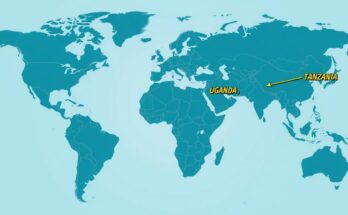Lebanese President Joseph Aoun will visit Saudi Arabia to seek support for his country’s economic crisis and to restore bilateral ties. The visit, his first since taking office, will focus on economic cooperation and security discussions, especially concerning Israel. Saudi Arabia’s historical role in Lebanon’s affairs is significant, and this visit aims to mend previously strained relations and attract investments.
Lebanese President Joseph Aoun is set to embark on a significant visit to Saudi Arabia on Monday. This trip marks his first official foreign engagement since his election on January 9, where he aims to secure assistance for Lebanon amid an ongoing financial crisis and the repercussions of last year’s conflict with Israel. The discussions are expected to concentrate on revitalizing bilateral relations, addressing Lebanon’s economic predicaments, and regional security, chiefly concerning Israel’s occupation of southern Lebanon.
The Lebanese leader’s visit follows an invitation from Saudi Crown Prince Mohammed bin Salman, initially extended shortly after Aoun’s election. Aoun had expressed his intention for Saudi Arabia to be his first destination abroad, noting the kingdom’s historic support for Lebanon and affirming Beirut’s dedication to Arab unity. Following the discussions in Riyadh, President Aoun will proceed to Egypt to participate in an Arab Summit.
Saudi Arabia has historically influenced Lebanon’s political framework, with its most notable contribution being the mediation of the 1989 Taif Agreement that concluded the prolonged civil war. For decades, Saudi Arabia has also been Lebanon’s primary financial supporter, with substantial numbers of Saudi tourists visiting Lebanon annually. Nevertheless, relations have soured significantly over the past decade due to Hezbollah’s escalating influence and its perceived threat to Saudi interests, resulting in limited diplomatic and economic exchanges.
The relationship between Lebanon and Saudi Arabia reached a nadir in late 2021 after remarks by Lebanese Information Minister George Kordahi criticized Saudi involvement in the Yemen conflict. This led to a diplomatic rift, with Saudi Arabia recalling its ambassador and expelling Lebanon’s envoy. The kingdom subsequently issued a ban on Lebanese food imports and cautioned citizens against traveling to Lebanon over safety concerns. Lebanon now seeks to overcome these obstacles under Aoun’s leadership.
Recently, Saudi Arabia has re-engaged with Lebanon via the Quintet Committee, alongside Qatar, the United States, France, and Egypt. This collaboration was instrumental in Aoun’s election, addressing a prolonged presidential void. Given Hezbollah’s diminished influence post-conflict with Israel and the loss of its ally Bashar al-Assad in Syria, there are expectations for Saudi Arabia to take a more active role in Lebanon’s future governance.
During his meeting with Crown Prince Salman, President Aoun is anticipated to focus on ensuring that Lebanon does not serve as a battleground for regional disputes or a source of illicit trade for Gulf countries. Discussions will prioritize Lebanon’s economic recovery, particularly the reform agenda of the new government led by Prime Minister Nawaf Salam, aiming to attract significant investment and aid from Riyadh.
Lebanon and Saudi Arabia are developing a suite of economic agreements aimed at revitalizing trade and investment. A total of 22 agreements have been prepared in collaboration with the Saudi Ambassador to Lebanon, covering various sectors, including agriculture and transportation. These agreements, once completed, could enhance economic ties that have suffered since a peak of $700 million to $800 million in annual exports to Saudi Arabia before tensions rose.
The cessation of trade relations has inflicted considerable financial losses on Lebanon, exacerbating its ongoing economic collapse, which commenced in 2019. The drastic devaluation of the Lebanese currency and the erosion of depositors’ savings have been attributed to longstanding issues of corruption and mismanagement by Lebanon’s ruling elite. Restoring trade with Saudi Arabia is vital for Lebanon’s economic resurgence and could provide essential foreign currency inflow.
In a notable diplomatic gesture, Saudi Foreign Minister Faisal bin Farhan Al-Saud visited Beirut on January 23, representing the highest-ranking Saudi visit to Lebanon in fifteen years. This visit signifies a potential thaw in relations and fosters optimism for renewing cooperation between Lebanon and Saudi Arabia, aiming to rebuild their historical partnership.
In summary, President Joseph Aoun’s upcoming visit to Saudi Arabia symbolizes a crucial effort to mend the longstanding relationship between Lebanon and Saudi Arabia. The discussions will prioritize Lebanon’s economic recovery and regional stability, vital for the nation grappling with a severe financial crisis exacerbated by conflict. The engagement may lead to significant economic agreements, restore diplomatic ties, and revitalize trade relations that are crucial for Lebanon’s stability.
Original Source: www.newarab.com




